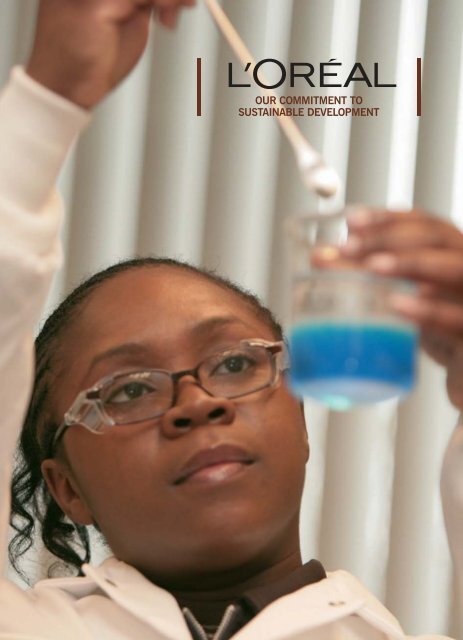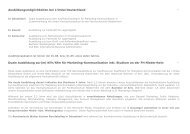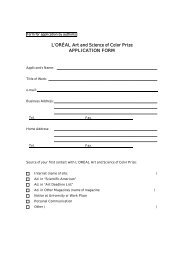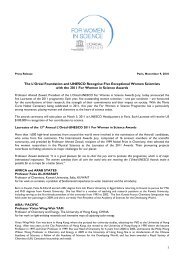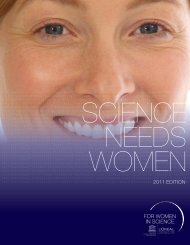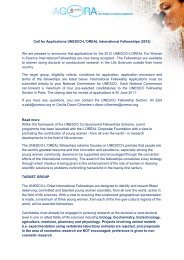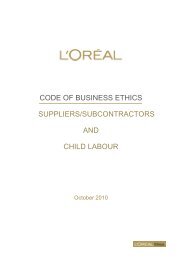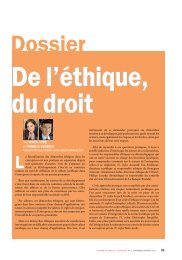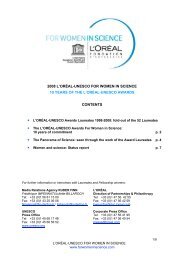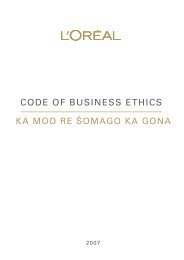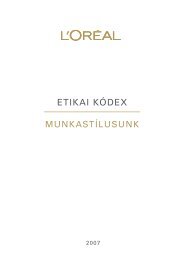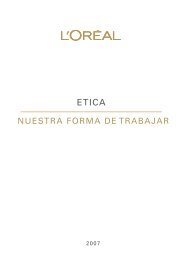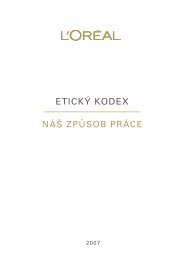OUR COMMITMENT TO SUSTAINABLE DEVELOPMENT
OUR COMMITMENT TO SUSTAINABLE DEVELOPMENT
OUR COMMITMENT TO SUSTAINABLE DEVELOPMENT
You also want an ePaper? Increase the reach of your titles
YUMPU automatically turns print PDFs into web optimized ePapers that Google loves.
<strong>OUR</strong> <strong>COMMITMENT</strong> <strong>TO</strong><br />
<strong>SUSTAINABLE</strong> <strong>DEVELOPMENT</strong>
52,403<br />
employees<br />
114.5<br />
billion in consolidated sales<br />
19<br />
global brands<br />
1496<br />
million in R&D investments<br />
42<br />
factories<br />
130<br />
countries<br />
4.4<br />
billion units manufactured annually<br />
Ms. Balanda Atis, Development<br />
Scientist, L'Oréal USA Research &<br />
Development laboratory in Clark,<br />
New Jersey.
PROFILE<br />
What is L’Oréal?<br />
L’Oréal is the global leader in cosmetics, with 19 global brands. We<br />
have five key expertises –hair care, hair colour, skincare, make-up and<br />
fragrances.<br />
What is this Report?<br />
This Report is a concise summary of our more detailed 2005<br />
Sustainable Development Report, which was published in June 2006.<br />
We hope this shorter, simpler version will be more suitable for<br />
employees, students and consumers. The full 64 page report can be<br />
found both on our website and in hard copy. Both reports cover all of<br />
L’Oréal’s operations and the joint venture with Galderma over the year<br />
January-December 2005.<br />
� PLEASE GET IN <strong>TO</strong>UCH!<br />
If you have any ideas, questions, feedback, or would like<br />
to request a copy of the full version, please contact:<br />
sustainabledevelopment@loreal.com
Our commitment to<br />
sustainable growth<br />
This document is a summary of our detailed<br />
Sustainable Development Report, which we published<br />
in June 2006. If you find any of the issues raised<br />
in this document interesting, we encourage you<br />
to go to the full report and find out more there<br />
www.loreal.com, in the Our Company section. If you<br />
have any ideas of how we can improve our sustainability<br />
performance, or have any questions, please get<br />
in touch with our sustainability team, at:<br />
sustainabledevelopment@loreal.com<br />
Our commitment to sustainable development_L’ORÉAL<br />
Jean-Paul Agon and Sir Lindsay Owen-Jones.<br />
Our growth must be based on a foundation of values<br />
shared by all within L’Oréal, on firm ethical standards,<br />
and a sincere awareness of our responsibility.<br />
We also demand respect for all people the company<br />
is in contact with, as well as the environment and<br />
the wider community.<br />
The very meaning of this business is to celebrate<br />
diversity. L’Oreal has made the universal dream of<br />
beauty a mode of individual expression that each
woman and each man can make their own, expressing<br />
all of their differences. We deeply believe that a<br />
company cannot fully integrate differences unless its<br />
teams are equally diverse. This diversity, more than<br />
any kind of homogeneity, makes us more creative,<br />
more imaginative and more dynamic.<br />
ACHIEVEMENTS<br />
We are proud of our environmental and social achievements<br />
this year:<br />
■ we won awards from the Anti-Defamation League<br />
and the World Diversity Leadership Council for our<br />
actions to promote diversity;<br />
■ we developed a methodology to assess our ingredients<br />
against a set of 25 sustainability criteria,<br />
including social, environmental and biodiversity<br />
impacts, and fair trade principles;<br />
■ we strengthened our management of diversity by<br />
appointing a Worlwide Diversity Manager, and diversifying<br />
recruitment sources;<br />
■ we continued our strong SHE performance, in particular<br />
reducing our injury rate by 21%, an absolute<br />
reduction in our water consumption, and increasing<br />
the proportion of waste that is returned to suppliers<br />
for re-use from 15% to 23%;<br />
02 l 03<br />
■ the launch in partnership with UNESCO of<br />
'Hairdressers of the World Against AIDS', a prevention<br />
education programme;<br />
■ the acquisition of SkinEthic in early 2006 which<br />
manufactures reconstructed human skin, to further<br />
strengthen our expertise in alternatives to animal<br />
testing;<br />
■ membership of the FTSE4Good, Ethibel and ASPI<br />
sustainability indices.<br />
Becoming a sustainable company is a long journey.<br />
We are both equally passionate about this. But we<br />
can’t do it without the support and enthusiasm<br />
of our employees and other stakeholders. If you have<br />
any suggestions on how we can make this company<br />
more environmentally friendly or socially responsible,<br />
please let us know. We look forward to hearing<br />
from you.<br />
“ WE WOULD VERY MUCH LIKE <strong>TO</strong> SHARE WITH YOU THE VALUES<br />
WE HAVE FORGED <strong>TO</strong>GETHER OVER CLOSE <strong>TO</strong> A CENTURY<br />
OF RESPONSIBLE AND <strong>SUSTAINABLE</strong> GROWTH, AND HOW WE<br />
ARE PUTTING THESE VALUES IN<strong>TO</strong> PRACTICE. ”<br />
SIR LINDSAY OWEN-JONES<br />
Chairman<br />
JEAN-PAUL AGON<br />
Chief Executive Officer
ECONOMIC AFFAIRS<br />
As an international business, L’Oréal is committed to growth that creates more value<br />
for more people with a stake in our success. The values that underpin our core business<br />
will be crucial as we grow further.<br />
L’Oréal is committed to creating value. In 2005, we<br />
injected E8.3 billion into the global economy in the<br />
form of goods purchased, employee salaries, tax<br />
paid, interest to banks, dividends to shareholders<br />
and community giving.<br />
VALUE CREATION in e millions<br />
2,852<br />
Total payroll and benefits<br />
659<br />
Distribution to shareholders<br />
17<br />
Donations to community,<br />
charity and civil society<br />
Our commitment to sustainable development_L’ORÉAL<br />
A GROWING MARKET<br />
Since 1990, the world cosmetics market has been<br />
growing at twice the rate of the annual global average<br />
GNP. It is still growing even in developed countries,<br />
thanks to new demands and new markets, but<br />
the growth of the cosmetics market is especially<br />
important in the emerging countries where the correlation<br />
between economic development and<br />
consumption of cosmetics is strong.<br />
A <strong>SUSTAINABLE</strong> GROWTH STRATEGY<br />
L’Oréal considers internal growth to be the main<br />
focus of its development. The group ensures healthy<br />
long-term geographic and sector-based balance for<br />
its brands and increases the rate of its international<br />
expansion through a highly selective acquisition
WORLDWIDE COSMETICS<br />
MARKET 1991-2005<br />
$ billions<br />
120<br />
100<br />
80<br />
60<br />
40<br />
20<br />
0<br />
63.4<br />
1991<br />
74.1<br />
1995<br />
95.9<br />
2000<br />
116.7<br />
2005<br />
policy. As a result, L’Oréal has enjoyed double-digit<br />
growth in earnings for many years. L’Oréal looks to<br />
the growth of new markets, especially in developing<br />
regions such as in Asia, Eastern Europe and Latin<br />
America.<br />
However, the group’s growth is never at the expense<br />
of a responsible attitude: by manufacturing locally as<br />
soon as practical, we contribute to local economic<br />
development, applying the principles outlined in our<br />
Code of Business Ethics. This code can be found on<br />
our website www.loreal.com<br />
COSMETICS BRANCH:<br />
2005 CONSOLIDATED SALES<br />
By business segment<br />
By Division<br />
By geographic zone<br />
04 l 05<br />
■ 24.7% Haircare<br />
■ 21.2% Make-up<br />
■ 16.6%<br />
Hair colourants<br />
■ 24.2%<br />
Skincare<br />
■ 10.3%<br />
Perfumes<br />
■ 3.0%<br />
Other<br />
■ 14.5%<br />
Professional Products<br />
■ 52.8%<br />
Consumer Products<br />
■ 25.2%<br />
Luxury Products<br />
■ 6.9%<br />
Active Cosmetics<br />
■ 47.4%<br />
Western Europe<br />
■ 27.2%<br />
North America<br />
■ 25.4%<br />
Rest of the World
RESEARCH & <strong>DEVELOPMENT</strong><br />
L’Oréal has a strong and historic commitment to research and development.<br />
R&D drives our business so that we provide an ever-expanding range of high<br />
quality, effective products for consumers.<br />
PRINCIPLES IN PRACTICE<br />
We are deeply committed to the health of our consumers<br />
and employees, as well as to the environment.<br />
We aim at all times to:<br />
■ guarantee the safety of ingredients and safe handling<br />
procedures for our raw materials;<br />
■ assess the human and environmental safety of our<br />
raw materials and formulas throughout the production<br />
process, from design to manufacture;<br />
■ increase the proportion of renewable plant-based<br />
raw materials that we use;<br />
■ protect biodiversity;<br />
■ carry out life cycle assessments of our common raw<br />
materials;<br />
■ assist our suppliers in integrating sustainable development<br />
issues;<br />
■ ensure that our purchase of raw materials supports<br />
local employment and development;<br />
Our commitment to sustainable development_L’ORÉAL<br />
■ guarantee local populations’ access to the source raw<br />
materials, recognise their ancestral know-how and<br />
take into account a fair return for these populations;<br />
■ consult with stakeholders, particularly community<br />
representatives.<br />
The R&D Department has a Sustainable Development<br />
working group to make sure these commitments are<br />
delivered. We have a Green Chemistry manager whose<br />
job it is to make sure our ingredients are made in an<br />
environmentally-friendly way. Eight part-time Green<br />
Chemistry roles have also been created.<br />
� DID YOU KNOW?<br />
Around 40% of raw materials used by L’Oréal are of<br />
plant origin and therefore renewable. We are working<br />
to increase this. We also seek to develop ingredients<br />
of low ecotoxicity or that are biodegradable.
PRODUCT <strong>DEVELOPMENT</strong><br />
L’Oréal is continually trying to cater more efficiently for<br />
people of diverse racial backgrounds. As part of the<br />
process of developing new products, we therefore<br />
study various skin and hair types from different parts<br />
of the world.<br />
L’Oréal R&D is also opening up to a better understanding<br />
of the emerging issues and processes<br />
surrounding the relationship to the body through a<br />
series of researches in social sciences.<br />
ALTERNATIVE TESTING METHODS<br />
In 1989 we ended all animal testing of finished products<br />
prior to their release on to the market. However,<br />
new chemical ingredients must be tested on animals<br />
by law where there is no other approved method.<br />
L’Oréal supports the 3R Rule –Refine, Reduce,<br />
Replace. We are committed to:<br />
06 l 07<br />
■ avoiding animal suffering and improve the comfort<br />
levels of these tests;<br />
■ reducing the number of animal tests;<br />
■ replacing animal tests with new testing methods so<br />
as to meet the 2009 and 2013 deadlines of the<br />
European Cosmetic Directive.<br />
For the past 15 years we have invested heavily in finding<br />
alternatives to animal testing. In particular, we<br />
invested in Episkin and in SkinEthic –companies which<br />
produce reconstructed human skin, thus eliminating<br />
the need for many of the tests.<br />
The L'Oréal Research Institute for Ethnic Hair and Skin in Chicago analyses how hair and skin change with ethnicity.
2 903<br />
cosmetics and dermatological<br />
research employees<br />
including 50% of Galderma research employees<br />
ASSESSING THE ENVIRONMENTAL AND<br />
SOCIAL IMPACT OF INGREDIENTS<br />
In 2005 L’Oréal added 25 environmental, social and<br />
ethical criteria to our system of assessing new ingredients.<br />
In the future, all our ingredients will be assessed<br />
on whether our use of them preserves biodiversity,<br />
promotes fair trade, and has positive social<br />
impacts. These are backed by research. If this shows<br />
that by buying a certain ingredient, we are contributing<br />
to deforestation, abuse of human rights or that local<br />
communities are not benefiting appropriately, we will<br />
take steps to resolve the issue.<br />
This sustainability assessment system is currently<br />
being piloted with eight suppliers and we are expecting<br />
to conclude the pilot by the end of 2006 and start<br />
general deployment in 2007.<br />
EXAMPLE OF THE ASSESSMENT OF<br />
ONE OF <strong>OUR</strong> RAW MATERIALS<br />
■ 100%<br />
Preserve health and safety of people<br />
■ 71%<br />
Preserve health and safety<br />
of the environment<br />
■ 87%<br />
●<br />
Protect biodiversity<br />
■ 85%<br />
Promote fair trade practices<br />
■ 100%<br />
Consider social<br />
and societal impacts<br />
529 patents filed in 2005<br />
Our commitment to sustainable development_L’ORÉAL<br />
●<br />
●<br />
●<br />
●<br />
Promoting Fair Trade Practices<br />
L’Oréal R&D is also working to extend partnerships<br />
with suppliers in order to share good<br />
practices and develop an effective sustainable<br />
development policy throughout the entire chain.
CONSUMER SAFETY<br />
The safe use of our products by consumers is our<br />
highest priority. For many years L’Oréal has applied<br />
very strict rules regarding the safety of ingredients. We<br />
keenly monitor all scientific research, and if scientific<br />
evidence were to show an ingredient to be harmful, we<br />
Nanotechnology<br />
This is a new technique we use to observe particles<br />
on a nanometric scale, which is a much<br />
smaller scale than we have been able to before.<br />
We use this new capability in three main ways:<br />
■ to examine the properties of skin and hair in<br />
even more detail;<br />
■ to create really small ‘nano-emulsions’ of very<br />
fine droplets, which give products such as<br />
creams different textures;<br />
■ to improve products, for example sunscreen<br />
where smaller particles filter UV rays more efficiently.<br />
Independent research has shown that nanoemulsions<br />
are harmless and that there is no<br />
penetration of nano-pigments (e.g. titanium<br />
08 l 09<br />
would remove it from our products. More precisely,<br />
our position on ingredients such as phthalates, musks,<br />
triclosan or parabens, and our reduction, replacement<br />
or substitution programs are detailed in our<br />
Sustainable Development report, p.24-27.<br />
By enlarging objects 10,000 times, these electronic microscopes are used<br />
to explore and understand the inner structure of the hair and skin.<br />
dioxide) into skin. Beyond these practical applications,<br />
the development of nanotechnology raises<br />
new questions, as for all major innovations,<br />
about the available scientific knowledge, ethical<br />
issues and potential applications.<br />
L’Oréal is involved in several French and international<br />
programmes including the International<br />
Council on Nanotechnology and the Center for<br />
Biological & Environmental Nanotechnology,<br />
Houston, and is working closely with academics<br />
and institutions such as the European Union<br />
Scientific Committee on Consumer Products, the<br />
Working Group on Nanosubstances in Cosmetics,<br />
and the CNRS-French Scientific Research Centre<br />
Ethics Committee.
SOCIAL AFFAIRS<br />
L’Oréal believes that employee development is a fundamental driver of economic<br />
performance. We therefore aim to be one of the world’s best employers in terms<br />
of overall appeal, pay, promotion, training, profit sharing and job satisfaction.<br />
DIVERSITY<br />
Diversity lies at the core of what we do. Because we<br />
believe that differences are a source of enrichment<br />
and creativity, we try to make diversity a key element<br />
of our human resources policy. Our Code of Ethics,<br />
which is available on our website, states that at<br />
L’Oréal, all forms of discrimination concerning gender,<br />
age, disability, race, religious or political beliefs<br />
and many other issues, are unacceptable.<br />
To promote diversity, we:<br />
■ signed up to the Diversity Charter in France, along<br />
with 200 other companies, as a public commitment<br />
to promoting cultural, ethnic and social diversity<br />
within L’Oréal;<br />
■ created the position of Diversity Manager whose<br />
job it is to improve diversity throughout the company;<br />
Our commitment to sustainable development_L’ORÉAL<br />
■ trained over one thousand managers worldwide<br />
on diversity issues.<br />
� DID YOU KNOW?<br />
■ 53% of managers at L’Oréal are women.<br />
■ 33% of the staff on management boards are women,<br />
■ in the US, 42% of the workforce in R&D are from<br />
minorities.<br />
■ There are 104 different nationalities among managerial<br />
staff.<br />
RECRUITMENT<br />
Attracting talented people is vital to support our<br />
growth worldwide. In 2005, we received 515,500 job<br />
applications, carried out 45,300 interviews, and recruited<br />
2,027 managers from 75 different nationalities!
� DID YOU KNOW?<br />
L’Oréal is consistently rated one of the best<br />
companies in the world to work for…<br />
■ We were voted the second most desired company<br />
to work for in a survey by the Universum Institute of<br />
5,373 European students.<br />
■ We were voted the second best at developing talent<br />
in the ‘Companies for Leaders in Europe’ survey of<br />
101 companies.<br />
■ In France, out of the 50 companies assessed using a<br />
questionnaire mainly filled out by the employees themselves,<br />
L’Oréal was ranked in fourth position of the companies<br />
that are great to work for. L’Oréal was also both the first<br />
French and first manufacturing company in the ranking.<br />
Skills development<br />
We aim to offer all our employees high quality training<br />
and tailored career development. In 2005, 62% of<br />
managers and 58% of all employees received training.<br />
In France we also took on 566 apprentices as<br />
part of this commitment.<br />
Rewarding employees<br />
L’Oréal tries to offer employees and their families the<br />
best reward packages and benefits possible. Our pay<br />
is designed to be highly competitive to attract and<br />
retain talented individuals. Since 2001 we have been<br />
rolling out a Worldwide Profit Sharing Plan, so that<br />
all employees can benefit from our success. In 2006<br />
through this scheme employees in almost all countries<br />
that meet their targets will be given the equivalent<br />
of an additional 3-3 1/2 weeks salary.<br />
Promoting social dialogue<br />
We believe that strong social dialog between management,<br />
employees and unions is vital for a healthy company.<br />
Over 24,000 employees are covered by our European<br />
social dialogue body, the Instance Europeénne de<br />
Dialogue Social (IEDS). In France, there are 91 bodies with<br />
over a thousand representatives to ensure partnership<br />
between management and employees reprensentatives.<br />
10 l 11<br />
Suppliers<br />
It is very important to us that all our suppliers maintain<br />
good labour standards in their operations. We do<br />
not want anything we sell to have been made in factories<br />
with poor conditions, wages, or child labour. To<br />
make sure this doesn’t happen, we send independent<br />
specialists, Bureau Veritas and Intertek, to carry out<br />
audits of the factories that we buy from. To date,<br />
more than 152 audits have been carried out.<br />
Where we find evidence of violations of these standards,<br />
we require suppliers to improve the situation,<br />
and our independent auditors then go back and check<br />
that this has been done. We believe it is better to work<br />
in this way to help improve labour standards, but in<br />
the few cases where suppliers have consistently poor<br />
standards, we will cease to buy from them.<br />
We are now introducing guidelines for our buyers to<br />
make sure they understand these issues, and will<br />
only give new business to suppliers who have been<br />
audited and who comply with our standards.<br />
More than 152 audits have been carried out.
SAFETY, HEALTH &<br />
ENVIRONMENT (SH&E)<br />
L’Oréal is passionate about improving the group’s performance on safety, health and<br />
environment. Our constant aim is to reduce our impacts on the environment and reduce<br />
the number and severity of accidents.<br />
<strong>OUR</strong> PERFORMANCE<br />
In 2005, at our 42 factories and 75 warehouses around the world, we:<br />
■ cut our total energy use by 1% per finished product;<br />
■ cut our water use by 4% per finished product;<br />
■ reduced our overall injury rate by 21% for L'Oréal employees,<br />
and by 36% for temporary employees;<br />
■ certified all but two of our factories to ISO 14001, an internationallyrecognised<br />
environmental management system.<br />
<strong>TO</strong>TAL ENERGY USED IN 2005<br />
836 million of kWh<br />
LOST TIME INJURY RATE<br />
-3.1%<br />
Unfortunately we did not meet our target to reduce the amount of waste<br />
generated per finished product. We also had an injury rate above our target of<br />
2.5 million hours worked in 19 of 42 factories and 20 of 75 warehouses. We<br />
are working hard to remedy these shortfalls.<br />
Our commitment to sustainable development_L’ORÉAL<br />
WATER CONSUMPTION<br />
3,214,000 M 3<br />
DIRECT CO 2 EMISSIONS<br />
92.7 thousand tonnes<br />
� <strong>OUR</strong> TARGETS FOR 2006<br />
This year we aim to:<br />
■ cut energy use by a further<br />
5% per finished product;<br />
■ reduce our direct carbon<br />
dioxide (CO 2) emissions by<br />
2% per finished product;<br />
■ cut water use by 10% per<br />
unit of finished product from<br />
2002 levels;<br />
■ reduce waste generated<br />
per finished product by 5%;<br />
■ reduce our injury rate by<br />
a further 24% to 2.5 injuries<br />
per million hours worked.
How is SH&E managed?<br />
Overall responsibility for safety, health and environment<br />
issues at L’Oreal rests with Marcel Lafforgue,<br />
Executive VP Production and Technology. Reporting<br />
to him, Zack Mansdorf runs the SH&E department<br />
with the help of SH&E managers within zones, divisions<br />
and at sites. A typical factory of 350 workers<br />
has three or four full-time staff in its SH&E department,<br />
while administrative sites usually have one<br />
person with this responsibility at country level.<br />
Climate change<br />
L’Oréal is working to reduce our energy consumption,<br />
as this makes sense financially as well as environmentally.<br />
Our greenhouse gas emissions are mainly CO 2 from<br />
the use of fossil fuels for the generation of steam in<br />
factories and for heating the group’s buildings. In<br />
addition, CO 2 is indirectly generated through our<br />
electricity use and by the transportation of our products.<br />
Of the energy we use in our factories and<br />
warehouses, 49% comes from electricity, 45% from<br />
gas and only 6% from oil. We use gas where possible<br />
since it is a cleaner fuel than oil. We are also<br />
continually looking out for less polluting transport<br />
solutions, such moving transport from road to rail.<br />
To achieve our target of a 5% cut in energy use per<br />
finished product this year, we are investigating many<br />
different new technologies –some that reduce our<br />
energy use and some that generate energy from<br />
renewable sources such as wind and solar power.<br />
For example, our Clark factory in the United States<br />
has committed itself to sourcing 3% of its energy<br />
from wind power, saving 186 tonnes of greenhouse<br />
gases as a result.<br />
Packaging<br />
Since the 1990s, L’Oréal has had a proactive policy to<br />
ensure that our packaging has minimal impact on<br />
the environment. When designing product packaging,<br />
we try to:<br />
12 l 13<br />
■ reduce the amount of raw material used;<br />
■ facilitate recycling by:<br />
- reducing the variety of materials involved;<br />
- labelling products with details of the components<br />
and their recyclability;<br />
■ continually involve our packaging suppliers in our<br />
efforts.<br />
� DID YOU KNOW?<br />
L’Oréal has an ambitious goal to send zero waste to<br />
landfill from our factories and warehouses. In 2005,<br />
38% of our sites achieved this target. We did this by<br />
recycling 35% of our waste, re-using 33%, and incinerating<br />
21% to generate heat.<br />
SH&E Awards<br />
The L’Oréal SH&E awards are in-house prizes<br />
designed to motivate employees to improve<br />
risk management and contribute to environmental<br />
protection. The aim is to foster continual<br />
improvement and encourage initiative and<br />
consistency.<br />
In 2005 the winners were:<br />
■ SH&E excellence, best performance beyond<br />
our stated SH&E goals (factories and distribution<br />
centres): Karlsruhe factory, Germany.<br />
■ The best safety and health initiative (factories):<br />
Soprocos Saint-Quentin, France.<br />
■ The best environmental initiative (factories):<br />
Ville Saint-Laurent, Canada.<br />
■ The best safety, health or environment initiative<br />
(distribution centres and office buildings):<br />
San Agustin distribution centre, Spain.<br />
■ The best community involvement (any site):<br />
Suzhou, Pudong and Yichang factories, China.<br />
These three factories are sited on the heavily<br />
industrialised Yangtze river, and set up an initiative<br />
to raise awareness among local<br />
schoolchildren of environmental problems<br />
and conservation of biodiversity, the white<br />
dolphin in particular. Around 6,500 children<br />
participated in the ‘Save Mother River and<br />
Save the White Dolphins’ initiative.
COMMUNITY AFFAIRS<br />
In every country where we do business, we support charities and projects that<br />
contribute to the community at large through philanthropy and long-term<br />
partnerships.<br />
FOR WOMEN IN SCIENCE<br />
� DID YOU KNOW?<br />
■ In 2004, of the 190 members of the French<br />
Academy of Sciences, only 14 were women.<br />
■ From 1903 to 2004, only 12 out of 503 Nobel<br />
Prizes for Science were awarded to women.<br />
■ 55% of scientists at L’Oréal are women, a proportion<br />
unmatched in our industry.<br />
Because we know that women today are underrepresented<br />
at the highest levels of science, and<br />
convinced that women researchers can influence the<br />
science of tomorrow, L’Oréal and Unesco joined forces<br />
in 1998 to promote women in scientific research<br />
by creating the For Women in Science programme,<br />
which has three parts:<br />
Our commitment to sustainable development_L’ORÉAL<br />
■ the L’Oréal-Unesco Awards –each year, five outstanding<br />
female research scientists around the world are<br />
given a personal award of $100,000. We give the awards<br />
for research in areas not related to L’Oréal’s activities;<br />
■ the Unesco-L’Oréal Fellowships –since this scheme<br />
started, 75 five young female scientists have been<br />
given awards of up to $20,000 each to pursue research<br />
in laboratories outside their country of origin;<br />
■ national Fellowship programmes –operating in 14<br />
countries in 2005, including China, India, Poland and<br />
South Africa, we aim to launch National Fellowships<br />
in 50 countries by 2008.<br />
“ WHEN YOU EDUCATE A MAN, YOU EDUCATE<br />
A PERSON. WHEN YOU EDUCATE A WOMAN,<br />
YOU EDUCATE A FAMILY, A NATION. ”<br />
An African proverb quoted by Unesco<br />
on its 50th anniversary.
Working with local communities<br />
Because L’Oréal’s business is at the centre of<br />
people’s everyday lives and well-being, we are closely<br />
involved in the life of the communities in which<br />
our facilities are located. Our local operations are<br />
given the freedom to adapt to specific local environments<br />
and choose the projects they feel most<br />
strongly about.<br />
AIDS prevention<br />
In May 2005, UNESCO and our Professional Products<br />
Division launched the prevention education programme<br />
“Hairdressers of the world against AIDS”.<br />
This programme promotes awareness of the HIV<br />
virus through the regular training we provide to our<br />
global network of hairdressers. These hairdressers<br />
then pass on their knowledge to customers at their<br />
salons, which are centres for the exchange of ideas<br />
and dialogue all over the world. Training materials<br />
compiled with UNESCO include an innovative film,<br />
presentation materials and an interactive quiz.<br />
Our efforts to combat HIV/AIDS began four years ago<br />
in South Africa. Pilot programmes adapted for the<br />
culture of each country have since been launched in<br />
India, Brazil and France. In 2006 we plan to expand<br />
the programme into the Baltic countries, the United<br />
Kingdom, China, Italy, Germany, Spain, Belgium, the<br />
Netherlands and Portugal. For more details, consult:<br />
www.hairdressersagainstaids.com<br />
Look Good… Feel Better<br />
“Look Good… Feel Better” is a joint programme of the<br />
cosmetic industry that started in the United States<br />
and has now reached 15 other countries, which helps<br />
women offset appearance-related changes from cancer<br />
treatment. The programme consists of non-medical<br />
workshops held in hospitals, which teach the<br />
women to cope with some of the side effects of<br />
chemotherapy through a 12-step skin-care and<br />
make-up lesson. L’Oréal is one of the main drivers<br />
behind this worthy venture, notably in France where<br />
the programme is called “La Vie de plus belle”.<br />
14 l 15<br />
Restaurants du Coeur<br />
For the past seven years, we have been providing the<br />
French charitable organisation “Restaurants du<br />
Coeur” with kits containing five of the group’s<br />
hygiene products covering basic family needs. They<br />
are handed out during the association’s winter campaign<br />
right across France.<br />
Supporting the Nicolas Hulot Foundation<br />
In 1995 L’Oréal became a founder member of the<br />
Nicolas Hulot Foundation for Nature and Mankind,<br />
and has supported it ever since. The Foundation’s<br />
mission is helping educate the public to be environmentally<br />
friendly.<br />
Staff volunteers for Planète Urgence<br />
In 2005 we set up a partnership with Planète<br />
Urgence, a French organisation which sends volunteers<br />
overseas to participate in various projects to<br />
help local people in their development efforts or to<br />
work on environmental protection programmes. Two<br />
of our staff volunteered to work in Mali in 2005, and<br />
a formal pilot is commencing in 2006 with a further<br />
eight staff volunteers.<br />
Hairdressers of the world against AIDS (China)
GOVERNANCE & ETHICS<br />
At L’Oréal we believe that lasting business success is built on ethical standards which<br />
guide growth and on a genuine sense of responsibility to the community at large.<br />
The L’Oréal Code of Business Ethics sets out our<br />
values and guiding principles in more detail. It focuses<br />
on six areas:<br />
■ respect for the law;<br />
■ respect for the individual;<br />
■ respect for the consumer;<br />
■ respect for the environment;<br />
■ partnership with customers, distributors<br />
and suppliers;<br />
■ principles of loyalty and integrity.<br />
Every new employee is given a personal copy, and it<br />
is available in 26 languages. We expect all employees<br />
to not only respect local law, but to comply with<br />
the standards in our Code, whatever the role or business,<br />
or wherever in the world they operate.<br />
Employees who have concerns relating to the Code<br />
are encouraged to contact their line management or<br />
Human Resources Department. All concerns are<br />
carefully examined, and we guarantee that there will<br />
be no retaliation for those who have in good faith<br />
raised a concern.<br />
In 2005 we launched a reporting system to monitor<br />
the implementation of the Code of Business Ethics,<br />
spread best practice and identify areas where improvements<br />
are needed.<br />
Our commitment to sustainable development_L’ORÉAL<br />
L’Oréal has been a signatory of the United Nation’s<br />
Global Compact since June 2003, which means that<br />
we support a set of core values in the areas of<br />
human rights, labour standards, environment and<br />
anti-corruption. We also require our suppliers to<br />
abide by the International Labour Organisation’s<br />
Declaration on Fundamental Principles and Rights<br />
at Work.<br />
HOW IS <strong>SUSTAINABLE</strong> <strong>DEVELOPMENT</strong><br />
MANAGED AT L’ORÉAL?<br />
L’Oréal’s progress on sustainability is driven by a<br />
Sustainable Development Steering Committee made<br />
up of managers from the different Divisions of the<br />
company and chaired by Pierre Simoncelli, the<br />
Director of Sustainable Development. This Steering<br />
Committee reports to the Executive Committee for<br />
Sustainable Development, made up of the five functional<br />
Executive Vice-Presidents and chaired by the<br />
Chief Executive Officer of L’Oréal, Jean-Paul Agon;<br />
this Executive Committee is responsible for overall<br />
sustainability strategy and implementation..<br />
EXTERNAL RATING<br />
L’Oréal’s progress on sustainable development has<br />
been recognised by others: we are members of the<br />
FTSE4Good, ASPI Eurozone and Ethibel sustainability<br />
indices. In September 2006 we re-entered the<br />
Dow Jones Sustainability Index.
Published by the Corporate Communications and External<br />
Affairs Division of L’Oréal group. Photographs: David Arraez,<br />
Léonardo Aversa/Gamma, Carole Bellaïche, Alain Buu, Bruce<br />
Coleman/Stock Image, Community Energy, Inc.,<br />
JF Deroubaix, Jillian Edelstein, idé, Hélène Kerhervé/Gamma,<br />
L’Oréal Recherche, Craig Marais, Johan Minaar/Status Studio,<br />
Sayah Msadek, Micheline Pelletier/Gamma, Alain Pérus &<br />
Myli Bourigault/L’OEil de Diaph, Kitti Sirichaiwat, Eric<br />
Vandeville/Gamma, Manuel Vasquez/C Producers Gamma, X.<br />
Design:<br />
133, avenue des Champs-Elysées<br />
75008 Paris – France<br />
This mark aims to certify the origin of papermaking<br />
fibres from integrated and sustainable<br />
forestry operations where controlled felling and<br />
replanting policies are enacted.<br />
The Selected Secondary Fibers mark certifies<br />
the use of recycled (secondary) pulp fibres<br />
originating from selected materials to ensure<br />
high quality raw materials which are free of<br />
impurities and mechanically sound.
Incorporated in France as a “Société Anonyme”<br />
with registered capital of €131,753,932<br />
632 012 100 R.C.S. Paris<br />
Headquarters:<br />
41, rue Martre<br />
92117 Clichy - France<br />
Tel.: +33 1 47 56 70 00<br />
Fax: +33 1 47 56 75 01<br />
Registered Office:<br />
14, rue Royale<br />
75008 Paris - France<br />
www.loreal.com


